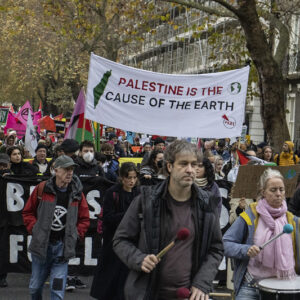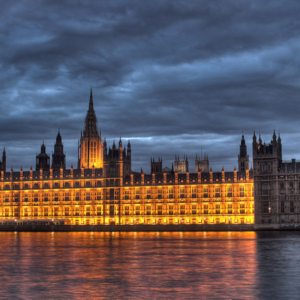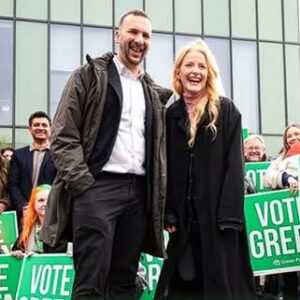“It’s 7 a.m. Sunday morning at the CGK US air base near the coast facing China. It’s already 27° and will reach the mid-30s later in the day. Captain Max Miller, the Episcopal chaplain, is preparing for his first service at 8 a.m. Small groups of soldiers and airmen are eating breakfast in the canteen, some watching Fox News, which is provided free for all US service personnel. This morning, the news is full of stories about growing conflict between the United States and the mainland. But the GIs are not much bothered. Same old, same old. Suddenly, they hear a swoosh overhead. Captain Miller reads it right away. It’s a cruise missile fired from a submarine less than 20 miles from the coast, flying low to avoid radar but not evading the watchful eye of US satellites. The missile is likely heading for Taiwan’s main radar station in the mountains, 40 miles away. ‘They’ll be coming for us next’, he thinks, and he sprints towards the shelter of the crypt of his makeshift chapel. As he runs, he spots the smoke trails of dozens of rockets launched from China; some of them are already being shot down by Taiwan’s anti-missile system. He knows that thousands of Chinese soldiers will soon be disembarked on the shoreline, and many will die—and so will many Taiwanese and American servicepeople.”
Is this a realistic scenario or a fantasy of the kind that cheap movies on Netflix and Amazon Prime have? Never say ‘never’ in politics, but this is, for the foreseeable future, well in the realms of fantasy—but a fantasy that is purveyed by many of the hard right politicians in the United States and Europe. Feeling that this cataclysmic scenario is a bit threadbare for assembling an anti-China coalition, the new cold warriors at the G7 meeting in Japan reached for the mantra of ‘economic coercion.’
‘Economic Coercion’
Well, China does attempt to exert economic pressure against states and companies that defy its will. Take the case of poor little Bhutan. Because it voted with India on human rights at the UN, China vetoed its paltry $100,000 a year from UNESCO for its World Heritage Rainforest. But China’s economic coercion is on a much smaller scale than the United States’ huge portfolio of countries (40 so far) and individuals sanctioned. And those sanctions have done untold damage, including hundreds of thousands of unnecessary deaths in Iraq, Iran, and Cuba—the latter over more than 60 years. Even today, the refusal of the United States to repay Afghanistan’s £7 billion deposit at the Federal Reserve is holding up the financing of food, health, and other basics. Once again, ordinary people in a Western-sanctioned state are paying the price.
It’s also true that China appears to be getting tougher, with poor states having difficulty repaying the interest on the huge loans doled out by China as part of its Belt and Road initiative. Nonetheless, Western states accusing the People’s Republic (PRC) of ‘economic coercion’ is deeply hypocritical.
In addition to the United States sanctions portfolio, the Europeans have been doing their bit.
The so-called “troika“—the European Central Bank, the European Commission, and the International Monetary Fund—operated economic coercion (aka ‘structural adjustment’) on a grand scale after the 2008 financial crash, for example against Portugal, Spain, and above all, Greece. Millions of Greeks were thrown into dire poverty, from which they have not escaped.
The IMF and the World Bank have been doing the same against the Global South for decades, collapsing economic development, healthcare, and living standards on a massive scale. Economic coercion is the way that imperialism works (find out more about what that means today here).
The only economic coercion that the United States is worried about is the one that is causing economists to predict that China will soon overtake the United States as the largest economy.
Is Taiwan a nation? Should socialists say they have a right to self-determination?
For the ‘campists’ on the international Left, the history of Taiwan’s origin is enough to solve the issue: Taiwan is part of China, full stop. But for the Left, which stands for social justice and democracy, the situation is much more complicated.
A key issue here is how we understand the national question. Nations and nationalities do not just exist forever. Over time, nations disappear and new ones are created.
An important question in defining whether any population group is a nation is whether they consider themselves to be a nation and whether they seek to express their nationhood through the establishment of an independent state, or sometimes through self-government in a federal state.
By this definition, the evidence is mixed. A recent opinion poll asking Taiwanese people how they defined their nationality gave the following decidedly ambiguous result:
Chinese: 4%
Taiwanese: 32%
Taiwanese and Chinese: 62%
This ambiguous outcome reflects the lack of clarity in the questions. A probable explanation is that a large majority think their ethnicity is Han Taiwanese, but they do not want—at least for the foreseeable future—to become part of the major state dominated by this ethnicity, the People’s Republic of China.
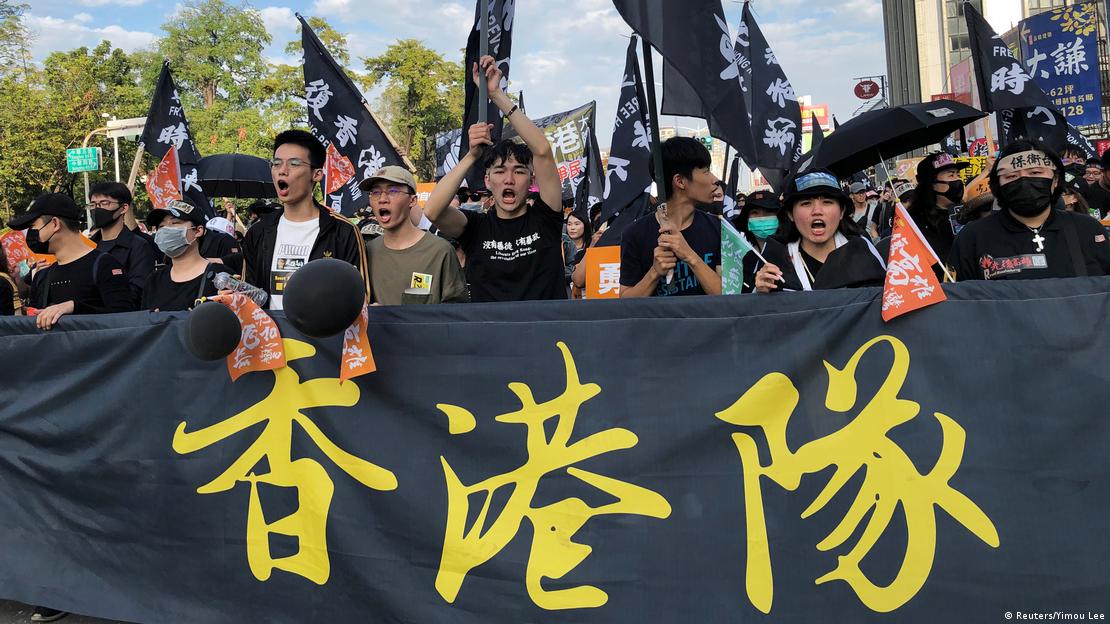
Parallel questions found a big majority saying they had no objections to unification with the mainland, provided it could be done on the basis of maintaining their current political and economic system, a repeat of what was originally understood in Hong Kong as ‘one nation, two systems.’ There is approximately zero percent chance of such an outcome in the foreseeable future. The Hong Kong example shows that the Chinese Communist Party (CCP) will never share power and will crush democracy in any of its offshore territories because of its fear that democratic liberties maintained for any length of time will spread democracy contagion to the mainland.
Socialists should defend the right to self-determination of the Taiwanese people as well as their current democratic freedoms. In any case, the CCP is hypocritical about what it means to be Chinese. In practise, they expect loyalty from all Han Chinese people, wherever they are in the world. At the same time, they expect loyalty from minority nationalities within the Chinese state mainland, for example, the people of Tibet and the Uighurs in Xinjiang province in the North West. The latter example led to the creation of massive concentration camps, imprisoning a whole people.
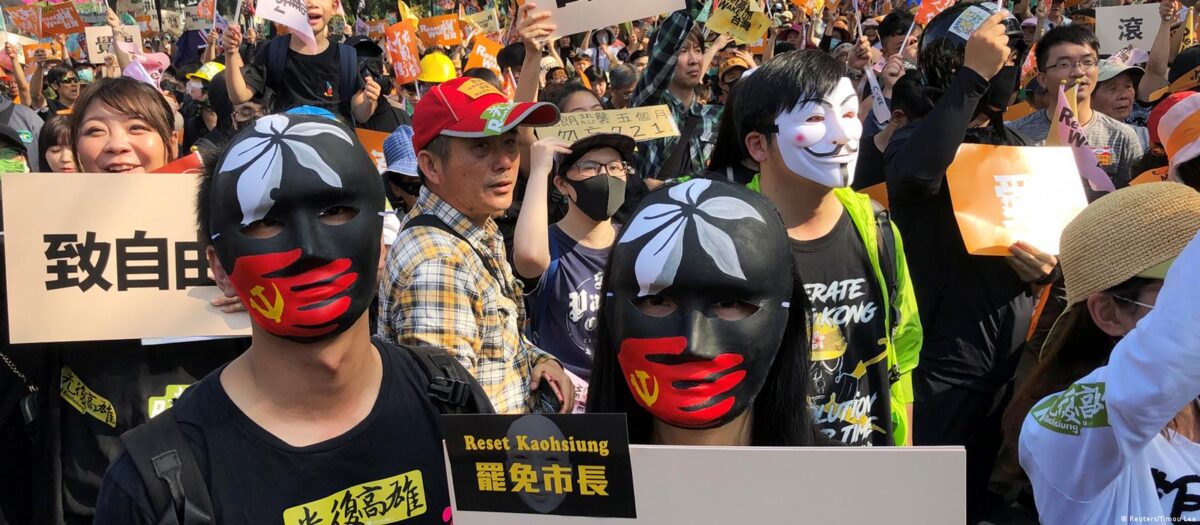
There is no question about the brutality of the CCP regime and its willingness to crush democratic movements and national minorities, as witnessed by its brutality in Tibet and Xinjiang Province and its savage crushing of the 1989 democracy movement. But the present economic and political environment makes a Chinese invasion of Taiwan highly unlikely.
China is the number-one trading partner with 120 states. Its economy and that of the United States are deeply entwined. China holds the debt of many countries, especially in the Global South. Shattering all that would mean a huge slump in the living standards of Chinese people. But see the counter-arguments on ‘reshoring’ below.
A very recent straw in the wind, though, is the howl of injured rage from US chip maker Micron when, at the end of May, China banned its products. This was a calculated response to the US, Japan, and the Netherlands banning China from buying advanced chips that could have military uses. China accused the US of ‘economic coercion, a warning shot to those who think China lacks the means to retaliate.
If a war would be a disaster for both sides, why are the PRC and United States locked in military competition?
The main reason for the present upsurge of conflict is that the United States is trying to leverage its massive military superiority, compared with any other country, to force its main economic rival, China, onto the back foot. Militarising economic and political rivalry is exactly what was foreseen by the 1997 document Project for a New American Century, authored by right-wing academics, military generals, and people like Donald Rumsfeld and Paul Wolfowitz, who went on to play a key role in the George Bush government. It is exactly what we have had since the invasion of Iraq and then the ‘pivot’ of the American military since 2008, when Barrack Obama pronounced the turn towards trying to establish ‘full spectrum dominance’ on the world’s most populous continent. As everyone knows, the right wing in the US and Britain sees the war in Ukraine as a warm-up for the real contest with China.
In view of the increased political attacks on China, there is a movement towards ‘reshoring,” or bringing production back from China to the US. A key example is Apple’s backing for a Taiwanese company opening a production facility for advanced microchips in the United States—in Arizona, not Taiwan. This is an insurance policy against chip production facilities being seized by China if they are left in Taiwan. It shows the extreme sensitivity of big capital to political changes in the United States.
Business consultants Alaverez and Marshal summed up the new theory of re-shoring. In the past, they argue, companies just went to increase shareholder value—profits. This is what led them to invest in cheap labour countries like China. But now people are realising that companies should benefit all ‘stakeholders,” like customers and employees. Customers will get a better deal if their specific needs can be rapidly accommodated, and that means close-at-hand production, not long supply chains. And of course, you can employ more local workers.
The jury is out on whether reshoring can become more than a temporary fad. But what happened at the start of the Ukraine war is a warning. Nearly every US firm with big investments in Russia folded or withdrew in the light of the massive political pressure. This tells us something about the limits of globalisation and the relationship between the state and big capital. The previous trend towards the formation of a transnational capitalist class (TCC) can be disrupted by the upsurge of right-wing nationalism in the United States and its allies. If a Republican wins next year’s presidential election, new anti-China sanctions and tariffs could see companies running for cover and trying to reset their production and markets. This kind of scenario would be disastrous for major European states, especially Germany, for whom China is their main trading partner.
However, reshoring may turn out to have been a brief fad. The Record Financial Group argues that customers will be unhappy with the higher prices that reshoring implies and that profits will, of course, remain the key variable for most companies.
“However given the costs of redeploying supply chains, limited quantity of US skilled labour in manufacturing, and still higher of cost labour relative to developing countries, it is an expensive and drawn-out proposal. As a result, companies with competitive business models and tight profit margins, particularly in manufacturing, have a more limited ability to pass on re-shoring costs to consumers and would likely increase prices or require government subsidies. Despite growing sentiment by consumers to “buy local”, consumer purchasing power is already under pressure and might challenge onshore business models.”
The danger is that Ukraine has opened a new period of war, the reasons for which are discussed below. Each new escalation of the Ukraine conflict and each new incident in the Taiwan Strait brings closer a NATO land war against Russia or a catastrophic war with China.
Another reactionary aspect of the growing political war against China is the trend towards replacing globalisation with hostile economic and political blocs. China has not stood still in the face of US sanctions and tariffs but has sharply increased its trade with Russia and sought to find new markets in the ‘neutral’ countries of the Global South, like India. But it has never budged from its general line: China favours globalisation and free world trade and is opposed to the division of the world into two hostile political blocs. This position is backed up by Western critics of hostile attitudes towards China, like Joseph Stiglitz.
What would a war with China look like?
The major planks of current US military planning in Asia are based on a coastal war with China. A key military doctrine, Multi-Domain Dominance, applied to Taiwan would encompass the doctrine of ‘Air-Sea Battle’, itself a product of the ‘tilt’ towards Asia (away from the former doctrine of ‘AirLand Battle’, which would be unfurled against Russia in the event of a wider war in which American or European combat troops were used).
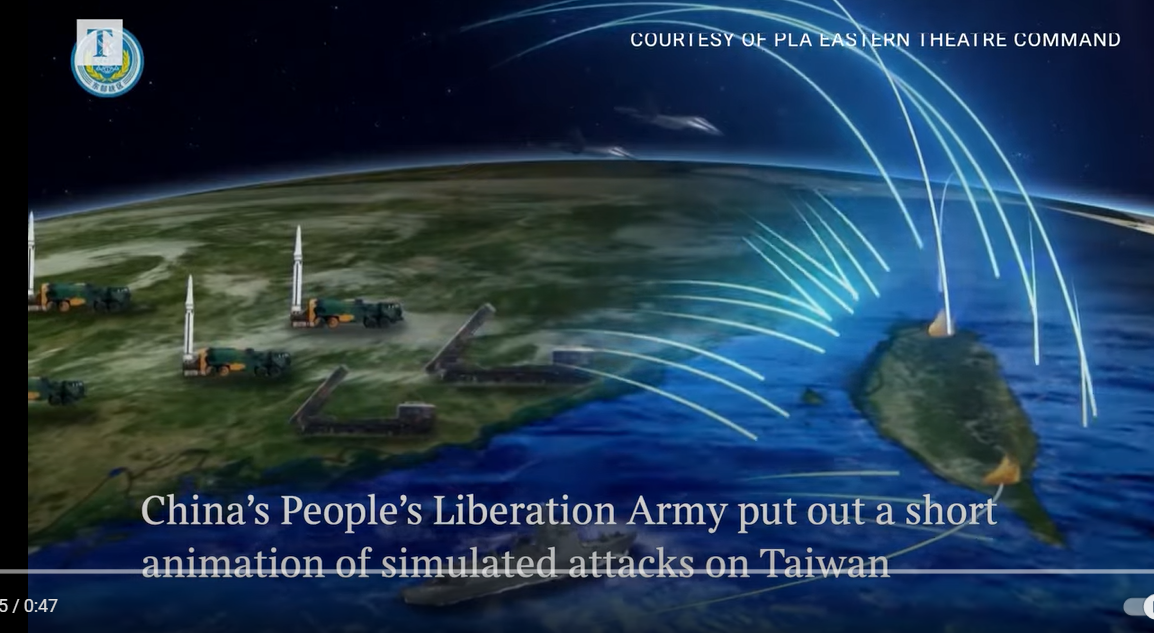
You can see straight away that AirSea Battle is about attacking China because of its central objective of “anti-access/area denial, which means breaking through China’s attempts to prevent US forces from piercing its forward defences when reaching the mainland. AirSea Battle means using long-range, precision munitions to suppress China’s defences and attack strategic targets on the coast and inland.
A war against China would have catastrophic consequences, however ‘limited’ to the Chinese coastline it was. The Centre for Strategic and International Studies has simulated a Chinese invasion of Taiwan. It concluded that it would lead to heavy losses on all sides, including potentially thousands of US sailors and soldiers, on a scale not seen since the Second World War. And of course, the losses in China and Taiwan would be huge. The impact on the world economy would also be catastrophic.
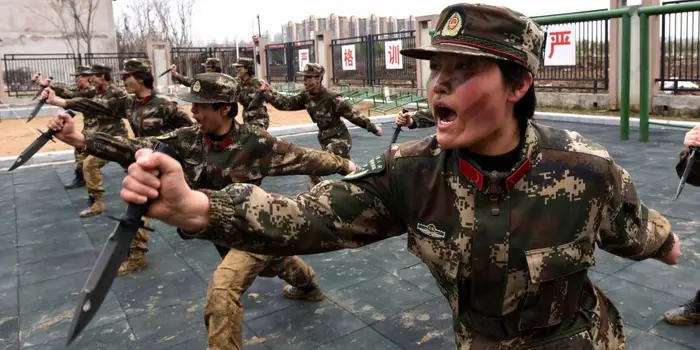
The doomsday scenario would be if America started retaliating for having its aircraft carriers sunk by attacking Chinese cities. After that, all bets are off.
How would a war with Taiwan affect the world economy?
The danger is that Ukraine has opened a new period of war, the reasons for which are discussed below. Each new escalation of the Ukraine conflict and each new incident in the Taiwan Strait brings closer a NATO land war against Russia or a catastrophic war with China.
Many nationalist politicians in the US and Europe want a tougher stance towards China, reshoring of production, tariffs against Chinese goods, and a political line that paints China as a threat to the West. But that does not mean that they want a war with China. As things stand, the United States and China are the world’s two most important economic centres, with massive co-dependency, notwithstanding the talk of reshoring and all the anti-Chinese tariffs.
Opposing the American military buildup in the Pacific does not mean painting China as an altruistic or even socialist power. China is an imperialist country, exporting finance across the globe, employing cheap labour in Africa and Latin America, and importing cheap minerals and agricultural products from the Global South. In its own way, China is militarising its response to the United States in the Pacific, to the benefit of its huge defence industry.
The defence industry internationally benefits from the spike in defence spending that the Ukraine War and confrontation between China and the US gave rise to—a key part of so-called ‘accumulation’. This represents not only the ‘military-industrial complex” but also the pressures of nationalism, the key ideological weapon of the radical right. These pressures are particularly strong in the United States and Britain. Opinion leaders in the United States argue that China is involved in a worldwide full-spectrum attack, focusing on a combination of economic, diplomatic, and cultural offensives to push the United States out of the way, even in its nearby territories in Latin America.
How does this impact British politics?
With an election looming next year, the Tories are trying to wrap themselves in the Union Jack and paint themselves as the champions of freedom in Ukraine and Taiwan. But because of factional disputes at the top of the Conservative Party, the hard right is pushing for an ever tougher attitude towards Beijing. Liz Truss has gone to Taiwan on a ludicrous mission to assure the people of the island of her support. Truss argues for an economic NATO to confront China.
More seriously, hard right Conservatives led by Ian Duncan Smith have established a ‘China Research Group’ to pressurise the British government into supporting a confrontational line towards China. Liz Truss has attacked French President Emmanuel Macron’s visit to Beijing and his public request to China to help end the Ukraine war. The increasingly restive Tory right wing is uncomfortable with the position of the Rishi Sunak government, which is to support an apparently ‘tough’ line against China while preserving all the key economic links. Brexit showed that the extreme right wing of the Conservative Party does not give a hoot about economic damage to British capitalism. For them, trashing the UK’s links with China is just collateral damage; the important thing is their electoral interests.
Does criticising American militarism mean you’re siding with Chinese imperialism?
Of course, socialists are opposed to all imperialist states. But in the Indo-Pacific region, it is the aggressive military stance of the United States that is giving rise to the current danger of armed conflict. Talk of China ‘doing a Ukraine’ with Taiwan is designed to back up the US political-military strategy of pressuring China.
China’s own military strategy is that of active defence. In previous decades, that has involved preparing for a defensive war on the Chinese mainland. Today’s Chinese military thinking plans for a war around the Chinese coast and its forward bases on reefs and artificial islands it has established in the Pacific. But there are absolutely no Chinese aircraft carriers on the coast of California.
The Left’s main demands should centre on rejecting the US’s attempts to militarise the whole Indo-Pacific region. The establishment of AUKUS, the military alliance of the US, Britain, and Australia announced in September 2021, shows clearly the attempt at US political dominance of the region—in alliance with its British and Australian allies—through military dominance. Simultaneously, AUKUS aims at squeezing out an independent European Union Indo-Pacific intervention, highlighted by the exclusion of the other European nuclear power, France.
In recent years, Chinese leaders have stressed that they seek peaceful unification with Taiwan. The United States has responded with dire predictions of imminent military aggression.
The Left should demand “demilitarise the Pacific’ and “no war over Taiwan’. And of course, it is in the interests of the people of Taiwan not to have a war and to manage relations with the People’s Republic peacefully. Taiwan is a small island, about 14,000 square miles, compared to Ukraine’s more than 600,000 square miles; in other words, Taiwan is less than 3% of the size of Ukraine and is very densely populated. The region between the coast and the mountains, where most people live, would be devastated by a war.
In April, the United States revealed four new military bases in the Philippines, plus two more on the island of Guam, where it already has a giant facility. In January, Air Force General Michael Minihan, head of the Air Mobility Command, predicted that the United States would be at war with China over Taiwan by 2025. He ordered a series of exercises to make US forces ‘combat ready,” including the simultaneous launch of two dozen giant C-5 Galaxy transport aircraft filled with paratroopers and masses of military hardware, in preparation for quickly sending more combat troops to Taiwan in case of emergency. America is aiming to quadruple the number of troops it has permanently in Taiwan, and according to the New York Times, it aims to turn Taiwan into a giant weapons depot.
The Ukraine war has made the unthinkable thinkable: major wars between states armed with nuclear weapons. The Left should not budge from its determination to fight this present period of militarisation, and those who are trying to goad China into an armed conflict.
Francis Fukuyama: Campism in reverse
Right-wing ideologues like Francis Fukuyama (see the video linked below) are operating a sort of ‘campism in reverse’. While left-wing campism says the world is divided into progressive and reactionary states, and brutal dictatorships like that in Syria get put in the ‘progressive’ camp, right-wing campists propose a mirror image of this.
The right-wing campism of the Francis Fukuyama type says that there is indeed a global fight between freedom and authoritarianism and that freedom is guaranteed by American military power, supported by its NATO allies, from Ukraine to Taiwan to Africa and Latin America.
Russia’s invasion of Ukraine has given massive impetus to this discourse, which goes along with a huge surge of militarism in Europe and East Asia in particular. The government expenditure that this has generated for the military is almost beyond belief. For example, the US, UK, and European Union have spent more than $140 billion on aid to Ukraine, with the vast majority of aid going to the military and weapons. It is time for the left in Europe and North America to raise their game in the fight against NATO and militarisation.
Taiwan democracy?
When we refer here to Taiwanese democracy, it means the democratic rights of Taiwanese workers, not, obviously, that the political regime is under the control of the working class and its allies. Taiwan is a bourgeois democracy in the same way that Japan or South Korea are. Thanks to the democracy struggles of the 1980s, the Kuomintang dictatorship was overthrown in 1987, and a bourgeois democratic regime with contending parties and wide political rights was established.
The death penalty is still on the statute books, but in 2022, only three people were sentenced to death, and no executions were carried out. There are limitations to same-sex marriages; these mainly relate to same-sex marriages in which one partner is from outside Taiwan.
Average salaries are lower than in many European countries, at about £1000 per month. Of course, there are many workers in Britain at or below this figure. Before 1987, all trade unions were linked to the Kuomintang, but today there are strong autonomous unions.
Appendix: What are the historical roots of the conflict?
The origin of the conflict is revealed in the formal name of the Taiwan state: the ‘Republic of China’ (ROC). Even on the Taiwan government website, the full name is reduced to its three-letter acronym because the implication of the full name of the state implies Taiwan claims sovereignty over the whole of China, which obviously is absurd, and in practice it does not. The name is just a historical hangover from the state’s 1949 origin, when the defeated extreme right-wing nationalist forces of Kuomintang leader Chiang Kai-shek fled to the island and established it as a final redoubt against the victorious Communist forces led by Mao Zedong. For years afterwards, the United States and the West sustained the fiction that the ROC represented the whole of China and, as such, was entitled to represent China at the UN, including on the Security Council. However, in 1971, the UN General Assembly overwhelmingly voted to accord the status of the legitimate government of China to the PRC government in Beijing. The United States and Australia voted against it, but the Heath government in Britain voted in favour. In 1979, the Jimmy Carter government in Washington changed the formal position of the United States and recognised the PRC government as the sole and legitimate Chinese government. And from that point on, relations between the US and Taiwan have been on an allegedly ‘informal’ level, but in practise, the US and many other states treated Taiwan like a de facto state.
Further reading/watching:
Liu Xiang: War Clouds Over Taiwan
William I. Robinson: Ukraine, the War Economy, and the Crisis of Capitalism
Rm. Sanchez Cedillo, interviewed by Pablo Iglesias How Ukraine Broke the Back of the European Left
Gilbert Achcar: For arms manufacturers, the war in Ukraine is a profit bonanza.
Eric Toussaint, The Debt System
Art (55) Book Review (127) Books (114) Capitalism (68) China (81) Climate Emergency (99) Conservative Government (90) Conservative Party (45) COVID-19 (46) EcoSocialism (60) Elections (83) Europe (46) Fascism (63) Film (48) Film Review (68) France (72) Gaza (63) Imperialism (101) Israel (130) Italy (46) Keir Starmer (56) Labour Party (115) Long Read (42) Marxism (49) Marxist Theory (47) Palestine (185) pandemic (78) Protest (154) Russia (343) Solidarity (152) Statement (50) Trade Unionism (144) Ukraine (351) United States of America (140) War (371)
Latest Articles
- Review: Gaza – the story of a genocideTony Richardson reviews ‘The story of a Genocide’ edited by Fatima Bhutto and Sonia Faleiro, publiished by Verso Books, 2025.
- Reforms – Choose Dignity, Unity and Human RightsWith the Government consultation closing on February 12th, Hackney Cllr Claudia Turbet-Delof issues an urgent call to action.
- Germany joins Hungary in prosecuting left‑wing activistsGus Fagan reports on the repression of anti-fascists by Germany and Hungary
- Why we back the Greens in Gorton and Denton by‑electionAnti*Capitalist Resistance statement on the Gorton and Denton by-election.
- Victory for Six Elbit activistsDave Kellaway celebrates a victory for Elbit Palestine Action activists and discusses the political implications


